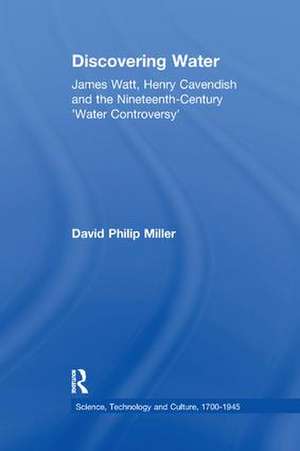Discovering Water: James Watt, Henry Cavendish and the Nineteenth-Century 'Water Controversy': Science, Technology and Culture, 1700-1945
Autor David Philip Milleren Limba Engleză Paperback – 6 mar 2017
| Toate formatele și edițiile | Preț | Express |
|---|---|---|
| Paperback (1) | 469.34 lei 6-8 săpt. | |
| Taylor & Francis – 6 mar 2017 | 469.34 lei 6-8 săpt. | |
| Hardback (1) | 1000.27 lei 6-8 săpt. | |
| Taylor & Francis – 21 mai 2004 | 1000.27 lei 6-8 săpt. |
Din seria Science, Technology and Culture, 1700-1945
-
 Preț: 310.88 lei
Preț: 310.88 lei -
 Preț: 475.16 lei
Preț: 475.16 lei -
 Preț: 469.34 lei
Preț: 469.34 lei - 18%
 Preț: 299.52 lei
Preț: 299.52 lei -
 Preț: 469.34 lei
Preț: 469.34 lei -
 Preț: 489.26 lei
Preț: 489.26 lei -
 Preț: 464.12 lei
Preț: 464.12 lei -
 Preț: 489.26 lei
Preț: 489.26 lei - 30%
 Preț: 820.73 lei
Preț: 820.73 lei -
 Preț: 469.34 lei
Preț: 469.34 lei -
 Preț: 469.34 lei
Preț: 469.34 lei -
 Preț: 486.49 lei
Preț: 486.49 lei -
 Preț: 416.22 lei
Preț: 416.22 lei -
 Preț: 469.34 lei
Preț: 469.34 lei -
 Preț: 469.34 lei
Preț: 469.34 lei - 22%
 Preț: 259.98 lei
Preț: 259.98 lei - 22%
 Preț: 259.98 lei
Preț: 259.98 lei - 12%
 Preț: 299.52 lei
Preț: 299.52 lei - 30%
 Preț: 821.13 lei
Preț: 821.13 lei -
 Preț: 489.26 lei
Preț: 489.26 lei - 26%
 Preț: 248.30 lei
Preț: 248.30 lei - 26%
 Preț: 876.78 lei
Preț: 876.78 lei -
 Preț: 383.93 lei
Preț: 383.93 lei - 16%
 Preț: 261.54 lei
Preț: 261.54 lei - 18%
 Preț: 1001.77 lei
Preț: 1001.77 lei
Preț: 469.34 lei
Nou
Puncte Express: 704
Preț estimativ în valută:
89.82€ • 97.53$ • 75.45£
89.82€ • 97.53$ • 75.45£
Carte tipărită la comandă
Livrare economică 22 aprilie-06 mai
Preluare comenzi: 021 569.72.76
Specificații
ISBN-13: 9781138258457
ISBN-10: 1138258458
Pagini: 330
Dimensiuni: 156 x 234 x 18 mm
Greutate: 0.45 kg
Ediția:1
Editura: Taylor & Francis
Colecția Routledge
Seria Science, Technology and Culture, 1700-1945
Locul publicării:Oxford, United Kingdom
ISBN-10: 1138258458
Pagini: 330
Dimensiuni: 156 x 234 x 18 mm
Greutate: 0.45 kg
Ediția:1
Editura: Taylor & Francis
Colecția Routledge
Seria Science, Technology and Culture, 1700-1945
Locul publicării:Oxford, United Kingdom
Cuprins
Contents: Preface; Introduction; The nature of discovery: the attributional model; The beginnings of a dispute and its interpretation; Attributional survey: phase one, 1784-1830; Keeping account: James Watts Jr and the filial project; The French connection: Arago re-opens the controversy; Managing the symbols of Victorian science: 'gentlemen of science' and the water controversy; The advocates of Watt: Brougham, Jeffrey and Muirhead; The defence of Cavendish: character, precision and discipline; The controversy joined, 1840-60; Still waters: attributional survey, 1830-1900; Conclusions; Appendix; Bibliography; Index.
Notă biografică
David Philip Miller is a Senior Lecturer in the School of History and Philosophy of Science at the University of New South Wales, Australia.
Recenzii
'... a highly nuanced, richly textured, and densely documented account... This interesting and enlightening study provides plenty of food for thought and further historical inquiry... another measure of this stimulating study, [is] that while dealing with an important issue in the history of chemistry, it raises significant questions about its historiography.' Annals of Science '... a helpful contextualisation that provides plausible categories that can be used by historians and scientists to understand the motives, ideas, institutions, and sources that shaped Victorian notions of who 'discovered' water.' Ambix '... this is a fascinating addition to the literature on the nature of discovery. Miller brings great clarity to the water debate and provides an impressive sweep of private correspondence that reveals the hidden negotiations, animosities and fears that drove the controversy.' British Journal for the History of Science ’Discovering Water offers many new insights into early Victorian science and the concept of science at the time, as well as stimulating ideas on scientific controversies...’ Isis
Descriere
Discovering Water addresses why the rival claims of long dead natural philosophers so preoccupied a wide range of people in the mid-nineteenth century. The answer to the question 'who was responsible for discovering water was a compound, not an element?' as David Philip Miller demonstrates, lies in understanding the enormous symbolic importance of James Watt and Henry Cavendish in nineteenth-century science and society. More than credit for a particular discovery was at stake here. The varied agendas of the participants in the Victorian water controversy led it to be driven by filial loyalty and nationalism but also, most importantly, by ideological struggles about the nature of science and its relation to technological invention and innovation in British society. At a more general and theoretical level, Discovering Water also provides important insights into conceptions of the nature of discovery as they are debated by modern historians, philosophers and sociologists of science.











